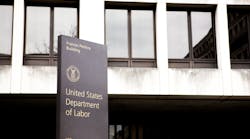Under President Trump, the National Labor Relations Board (NLRB) has seized the opportunity to reverse many of the policies embraced during the eight years of the Obama-era NLRB, including removing previous restrictions on employer policies that address disruptive behavior by their workers.
Just this year, the board has allowed employers to ban nonemployee union organizers from their premises, and made it easier for employers to discipline workers who engage in rude and angry expressions even when wages and working conditions are being discussed. In 2018, NLRB general counsel Peter Robb also tossed out many of the previous board’s restrictions in regard to employee handbooks.
However, the overall question of just how restrictive employer policies can be regarding speech has remained unresolved. In September, the NLRB opened a proceeding involving the disciplining of an employee by General Motors and is seeking public input on the limits of abusive speech in a labor law context.
In the General Motors case, the employer suspended an employee because he made a profane remark to his supervisor while engaged in union activity. An NLRB administrative law judge found the employee’s remarks were protected by law in spite of his profanity and held that GM committed an unfair labor practice when it disciplined him.
The board is seeking input on the following questions:
- Under what circumstances should profane language or sexually or racially offensive speech lose the protections of the National Labor Relations Act (NLRA)?
- To what extent should the “realities of industrial life and the fact that labor disputes engender ill feelings and strong responses” be applicable with respect to the use of profanity or language that is offensive to others on the basis of race or sex?
- Should the board consider the norms of the workplace, that is, whether profanity is commonplace and tolerated, and, if so, should it consider employer work rules prohibiting profanity, bullying, or uncivil behavior?
- Should the NLRB adhere to, modify, or abandon the standard the board applied in certain enumerated cases to the extent that it permitted a finding that racially or sexually offensive language on a picket line did not lose the protections of the labor law?
- What relevance should the board accord to anti-discrimination laws in determining whether an employee’s statements lose the protections of the NLRA and how should the board accommodate an employer’s duty to comply with such laws and its duty to protect employees in the exercise of their rights under the law?
Attorneys Keahn Morris, John Bolesta and James Hays of the law firm of Sheppard Mullin Richter & Hampton believe the board will overturn decisions by the Obama NLRB granting protection to employees represented by unions who voice extremely profane and racially-charged language in the workplace.
“Current anti-harassment and anti-bullying laws may require an employer to take adverse action against a worker for their use of such ‘bad’ language,” they point out. “However, when those remarks are made while an employee is engaged in union or other protected concerted activity, then, depending upon the employee’s remarks and the context in which they are made, disciplining them for their use of inappropriate language may be an unfair labor practice.”
Embracing Common Sense
Last August, the NLRB issued a memorandum declaring that nine standard employer policies that during the Obama era had been presumed to be unlawful are now be presumed lawful, a move characterized as “common sense” by Jerry L. Stovall, Jr., an attorney with the law firm of Breazeale Sachse & Wilson.
The nine policies now presumed to be legal are:
1) Civility rules.
2) No photography or audio recording on company premises.
3) Bans on insubordination, non-cooperation and adversely affecting operations. “In a surprising moment of clarity,” as Stovall put it, the board stated that “an employer has a legitimate and substantial interest in preventing insubordination or non-cooperation at work. Furthermore, during working time an employer has every right to expect employees to perform their work and follow directives.”
4) Bans on disruptive behavior such as “horseplay, fighting, roughhousing, yelling, profanity, hostile or angry tones, throwing things, slamming doors, waving arms or fists, verbal abuse, destruction of property, threats, or outright violence.”
5) Protecting confidential and proprietary information of the employer, as well as customer information.
6) Prohibiting defamation or misrepresentation.
7) Not allowing unauthorized use of company logo or intellectual property.
8) Requiring authorization before an employee may speak for the employer.
9) General prohibitions against disloyalty, nepotism, or self-enrichment.
Policies that continue to be presumed unlawful by the board are not permitting discussion or disclosure of information about wages, benefits, or other conditions of employment; and banning employees from joining outside organizations or voting on matters concerning the employer.
“Under the Obama administration, the board took the position that these nine policies could have an unlawful ‘chilling effect’ on employees’ exercise of their rights to engage in protected concerted activity under the NLRA,” Stovall noted. “Apparently, that position has changed.”



